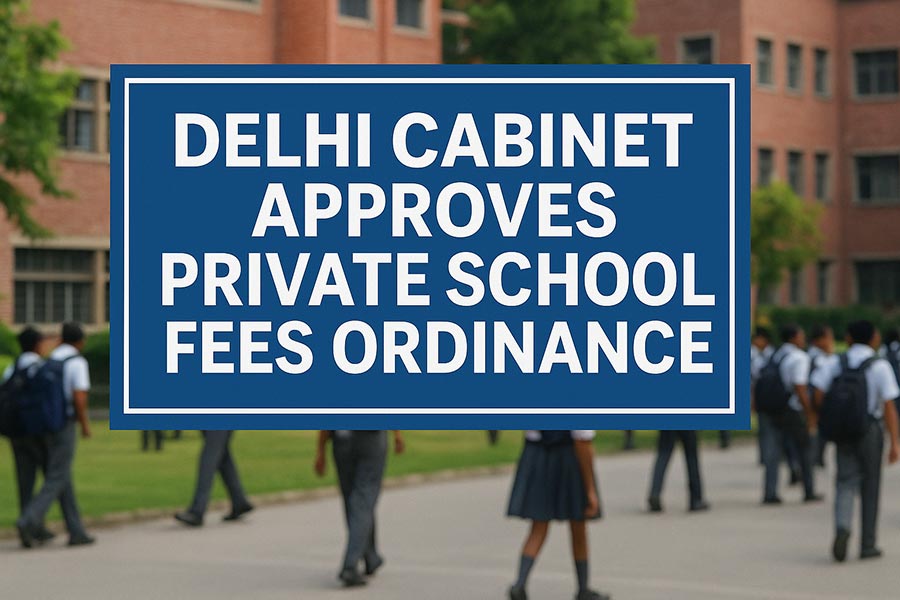New Delhi, June 10, 2025 — In a significant move aimed at increasing transparency in education, the Delhi Cabinet under Chief Minister Rekha Gupta passed the Delhi School Education (Transparency in Fixation and Regulation of Fees) Ordinance, 2025. The ordinance seeks to curb arbitrary fee hikes by private schools across the national capital and strengthens student employability through facilitated internship pathways.
📌 What the Ordinance Covers
- No retrospective fee increases:
The ordinance applies from April 1, 2025, making it retroactive. Schools are barred from imposing last-minute or excessive fee hikes after this date reuters.com+15questplus.in+15timesofindia.indiatimes.com+15arxiv.org+15reddit.com+15timesofindia.indiatimes.com+15timesofindia.indiatimes.com+2timesofindia.indiatimes.com+2timesofindia.indiatimes.com+2. - Establishment of three monitoring panels:
To ensure schools comply with the new norms, three independent panels will be created. These bodies will handle fee hike requests and determine their validity timesofindia.indiatimes.com+3admissionxpert.in+3timesofindia.indiatimes.com+3. - Greater transparency and accountability:
Schools must now present clear financial documentation when requesting fee escalations. Arbitrary fee hikes without justified reasons will be disallowed.
🎯 Why This Matters
For parents in Delhi, private school fees have been a longstanding source of financial stress and distrust. Numerous complaints highlighted how schools frequently:
- Increase fees without explanation
- Levy hidden charges
- Offer poor value for elevated tuition
By requiring schools to justify fee changes and gain approval, the ordinance:
- Reduces the risk of fee exploitation
- Helps parents budget more realistically
- Restores confidence in private school admissions
“This will act as a strong shield for parents against unpredictable education costs,” said a Delhi Education Department official (on condition of anonymity).
💼 Plus: Internship Schemes Approved
In a complementary decision, the Cabinet also sanctioned internship programmes linked to secondary and higher secondary education timesofindia.indiatimes.comtimesofindia.indiatimes.com. These initiatives aim to:
- Offer practical work experience to students
- Enhance employability and workplace readiness
- Bridge academic studies and real-world application
Details about the schemes—such as duration, selection criteria, and partner organizations—will be released in the coming weeks.
🏛️ Implementation Timeline
| Phase | Timeline |
|---|---|
| Ordinance notified | June 10, 2025 |
| Monitoring panels appointed | Within 30 days |
| Fee hike request deadline | Immediately effective |
| Internship schemes launched | Starting August 2025 |
✅ Expert Analysis
Dr. Meera Sharma, education policy expert, notes:
“This ordinance brings much-needed oversight to the private school sector. When combined with hands-on internship experience, the move signals a shift toward practical and equitable education.”
Ashok Verma, executive of a private education association, praised the regulation’s guidelines—but cautioned:
“Conducting year-round internships will require coordination. Schools will need to work closely with industries to make this effective.”
🌍 Context: A Wider Shift in India
Delhi’s move aligns with other state reforms aimed at regulating private education:
- Rajasthan recently passed similar legislation enforcing registration and fee transparency in coaching centers timesofindia.indiatimes.com+15en.wikipedia.org+15timesofindia.indiatimes.com+15newindianexpress.com+15questplus.in+15timesofindia.indiatimes.com+15timesofindia.indiatimes.com+15newindianexpress.com+15timesofindia.indiatimes.com+15timesofindia.indiatimes.com+11reddit.com+11timesofindia.indiatimes.com+11timesofindia.indiatimes.com.
- Telangana has proposed basing college admission primarily on exam scores to reduce dependency on private coaching schoolnewsonline.com.
At the national level, the National Education Policy 2020 also promotes regulated private sector participation, increased transparency, and extended vocational-learning components.
🎓 What It Means for Students and Parents
- Immediate Impact: No surprise fee increases for a growing number of private school enrollees.
- Mid-Term Benefit: Students will gain workplace exposure through internships, supporting career readiness.
- Long-Term Effect: If successful, this model could spread to other cities, making basic education more predictable and practical.
🚨 Concerns to Watch
- Administrative Challenges: Setting up panels and processing fee requests will require judicial neutrality and efficiency.
- Internship Logistics: Effectively rolling out internships needs strong partnerships between schools, NGOs, and companies. Rural schools and underserved communities may face additional barriers.
🔮 What’s Next
- Upcoming public consultations: Stakeholder meetings involving schools, parents, and industry leaders.
- Monitoring promises: Regular publication of panel reports and fee decisions.
- Internship pilot rollouts: Initial programmes expected in Delhi schools by August–September 2025.
🔹 Bottom Line
Delhi’s new ordinance is a bold step toward transparent, accountable, and future-focused education. By regulating private school fees and introducing structured internship schemes, the Delhi government is aiming to ease financial strain on families while addressing the gap between schooling and real-world skills. If effectively executed, it could serve as a blueprint for educational reform elsewhere in India.

